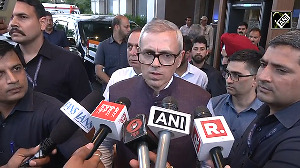'Not paying workers enough will end up being self-destructive or harmful for the corporate sector itself.'

Raising concern over poor compensation to employees by India Inc, Chief Economic Advisor Dr V Anantha Nageswaran on Thursday said this could adversely impact consumer demand and might prove to be self-destructive for the corporate sector.
Dr Nageswaran's comment came after analysts cited lower urban wage growth as one of the reasons for the seven-quarter low gross domestic product (GDP) growth in the July-September period.
"In reacting to this number (5.4 per cent GDP growth), we should not throw the baby out with the bath water because the underlying growth story still remains intact," he said.
Speaking at an Assocham event, Dr Nageswaran highlighted that profitability (profit after tax) of Nifty 500 companies as percentage of GDP was at a 15-year high in FY24 at 4.8 per cent.
"The staff cost of private-listed companies has been coming down. Corporates have used the profits to deleverage.
"Now, it is time to engage in a good combination of capital formation and employment growth as well.
"Without that, there will not be adequate demand in the economy for corporates' own products to be purchased.
"In other words, not paying workers enough will end up being self-destructive or harmful for the corporate sector itself," he cautioned, adding that the government was already doing its best to incentivise job creation in the economy and that fiscal incentives can go only that far.
Referring to the low GDP growth in the September quarter, Dr Nageswaran said the number was not seasonally adjusted and could be revised upwards, adding that a growth estimate of 6.5 to 7 per cent for FY25 was still feasible.
"The global backdrop is far from conducive for us. We have to live with uncertainties.
"Therefore, we need to pull all the domestic levers for growth," he added.
Dr Nageswaran emphasised the need to change the present incentive structure for small and medium enterprises (SMEs), which encourages them to remain small.
"When we have lots of concessions given to enterprises on a threshold basis, many of them, unfortunately, choose to remain below the threshold so that they can enjoy the concessions.
"Therefore, one way to look at it is not to have thresholds on an absolute basis but to make the thresholds more in tandem with GDP.
"If you say that if you are a small entrepreneur with less than 10 employees, you enjoy concessions, then businesses choose to subdivide themselves into units of less than 10 to continue to enjoy those concessions.
"So the tyranny of thresholds has to be broken if we aspire to grow," he added.
For bridging the gender divide in jobs, Dr Nageswaran said policy can do more for deregulation of around 180 restrictions at the local and state levels.
"These occupations, such as glass making and plastic production, are deemed risky to participate in at a time when women are fighter pilots and participating in defence and flying domestic airlines.
"If you want to increase female labour force participation or employment, the focus has to be on plumbing deregulation in states and local governments.
"Deregulation or letting go is going to be a big theme for the coming Economic Survey as well," he added.
On the question of whether India can become a manufacturing hub without China, Dr Nageswaran highlighted that India needs to first resolve the question of integrating China into its supply chain before thinking about how to integrate itself into the global supply chain.
Countries which had increased their exports to the United States, he added, had simultaneously seen their imports from China increase.
Feature Presentation: Ashish Narsale/Rediff.com













 © 2025
© 2025